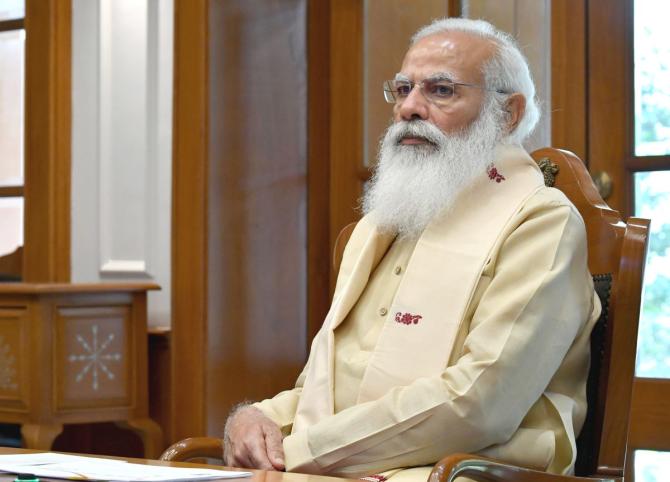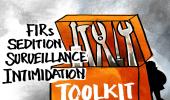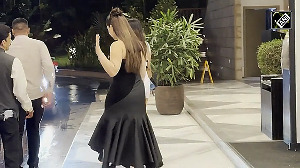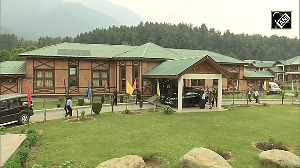Social media is reflecting a reality that the BJP does not want communicated.
More people are saying things on social media that are upsetting the government, asserts Aakar Patel.

Twitter has marked tweets by Bharatiya Janata Party figures including its spokesman Sambit Patra as 'manipulated media'.
The BJP publicised what it said was a Congress toolkit to defame India.
But the fact checking Web site Altnews showed that this content the BJP was showing was fake.
The BJP said that on its letterhead the All India Congress Committee had distributed instructions to Congress workers, volunteers and supporters to use the term 'super spreader Kumbh', 'not comment on Eid gatherings', 'use dramatic pictures of funerals and dead bodies which is already being done by foreign media'.
This turned out to be bogus and even the letterhead was forged, as Altnews quickly showed.
Twitter believed the fact-checking Web site, which is based in Ahmedabad, more than it did the Government of India and branded the content fake.
The BJP is upset and has sent another threatening note to Twitter saying it should remove the 'manipulated media' tag because the government was investigating the matter.
The problem, of course, is that the government first defamed the Congress, then it got caught peddling a lie and now it claims it is checking its own claim -- amplified by all its ministers through their official accounts -- to see if it is true.
That is why a small news operation has more credibility today than the government of the republic of India.
Twitter has a transparency centre where it puts up the data on takedown and information requests.
These are legal notices from the Government of India asking Twitter to either block an account, take down some content the government does not like or reveal the identity of a user.
From January 2012 to June 2014 it rarely received requests from the Indian government except for one or two.
In the second half of 2016 it received 151 requests.
This doubled to 306 between January and June 2018.
It doubled again to 662 between July and December 2019.
Between January and June 2020, the latest period for which data is available, the Modi government sent 2,367 requests including those to reveal identities, those it wanted blocked and those whose content it did not like and wanted taken down.
The question is why is the government now sending thousands of 'requests' to Twitter to comply?
The answer is that social media is reflecting a reality that the BJP does not want communicated. More people are saying things on social media that are upsetting the government.
One way to deal with this would be to ignore it, which is what the governments of India did in the past which is why the number of takedown notices Twitter received were few.
But if a government is sensitive to what is said about it, and sensitive to such an extent that it finds criticism intolerable then it will do what is going on in India social media today.
Twitter is slightly different from Facebook, and pretends to have more independence and pretends to be a guardian of free speech.
Facebook is just a cut-throat corporate company that will go to bed with authoritarian governments and do whatever they want in terms of blocking users and content and promoting the government's material even if it incites violence.
Twitter says it stands for freedom of its users, that it is 'committed to the open exchange of information' and that it is why it publishes this transparency report from which the data above has been taken.
India is not the only democracy which makes such requests of Twitter.
In the United States the secret service, which protects the president, is obliged to assess every threat made against the president even if it is made casually.
But this is not censorship of views. What is happening in India is that criticism of the government is not being allowed.
And the deliberate vilification of the Opposition by the government is being pushed, and when it is caught it resists accountability.
India is going the way of China, where social media has to be in full compliance with the government's desire to control the messaging and to carry out mass surveillance.
It is nobody's case and certainly not mine that India was ever some haven of free speech before the Modi government.
It was not. Few democracies have the full force of government backing the blocking of free speech of citizens as is the case in India.
We have jail terms for free speech under laws like sedition, criminal defamation, criminal contempt and laws which criminalise things communicated in words or even without words. This has always been the case.
But the criticism of the government was not intolerable as it has become now.
This government insists on only one narrative, and is willing and enthusiastic about stopping the other side from expressing itself.
And it is also, as the toolkit fiasco shows, willing to fabricate material to invalidate what anyone else says.
This is what the Emergency must have been like, and those who lived through it might not be feeling very different today.
Aakar Patel is a columnist and writer and you can read Aakar's earlier columns here.
Feature Presentation: Aslam Hunani/Rediff.com










